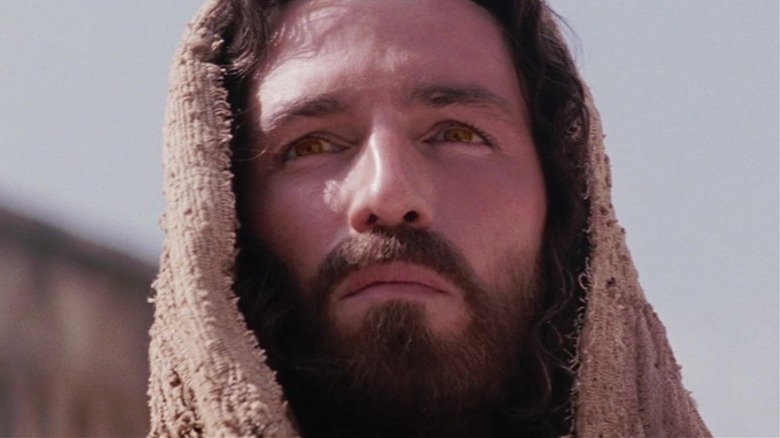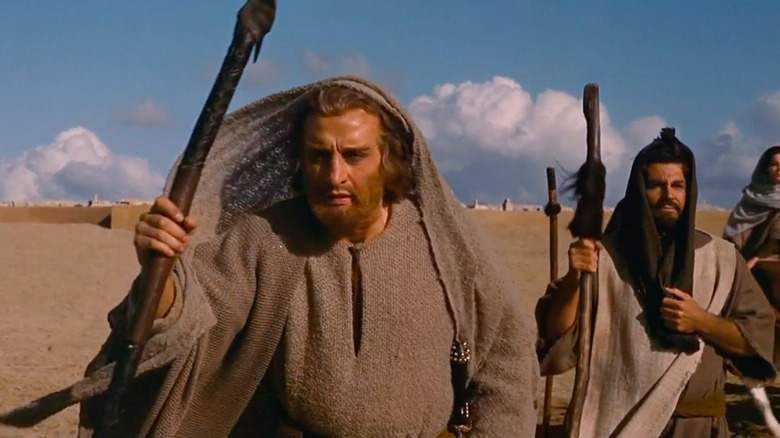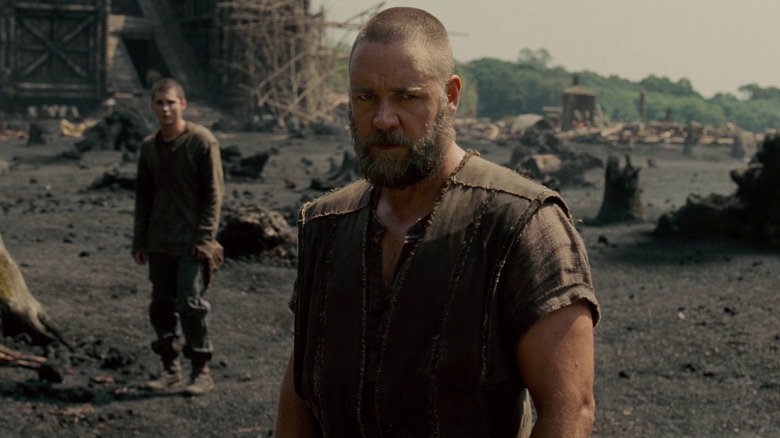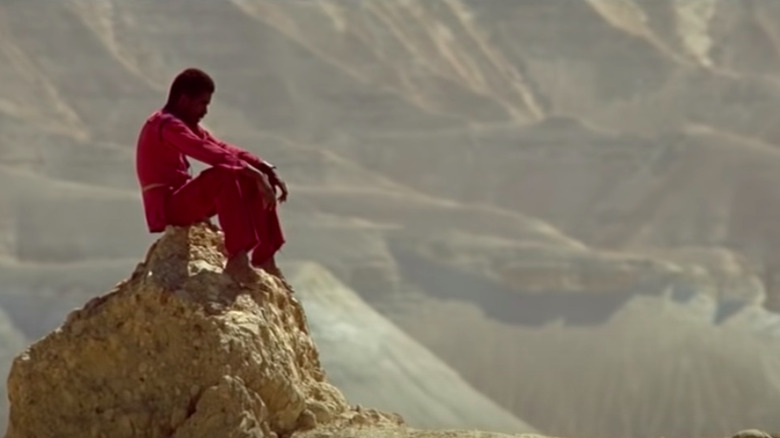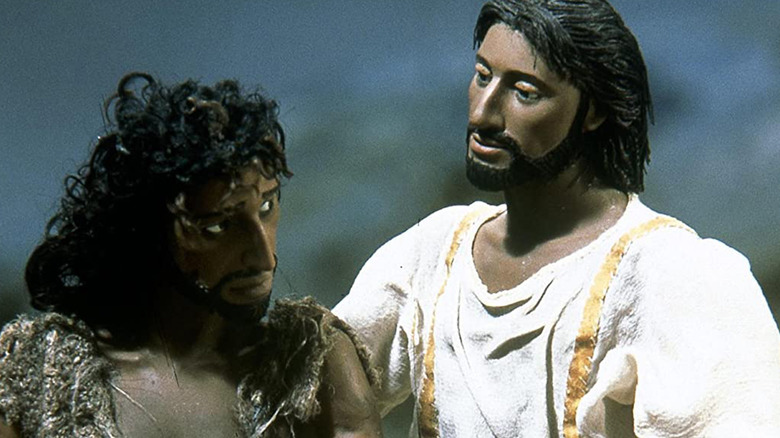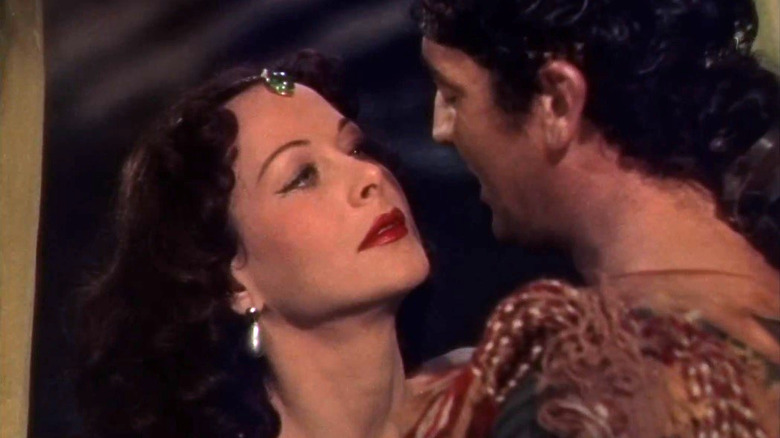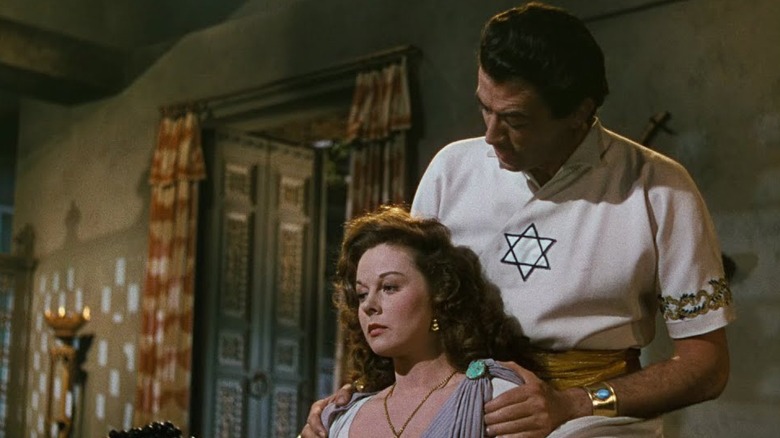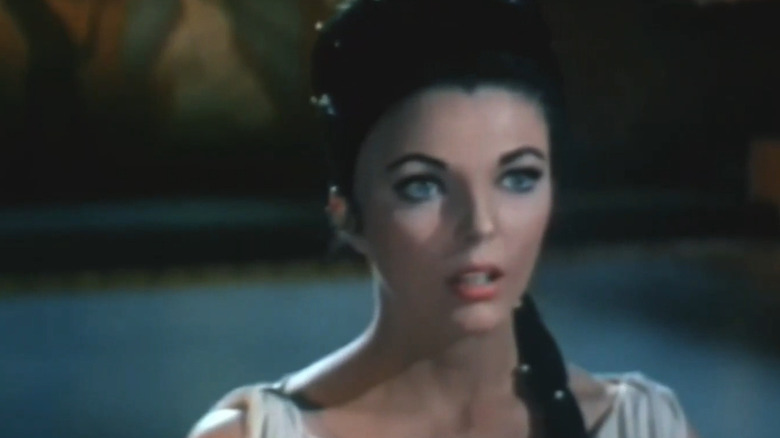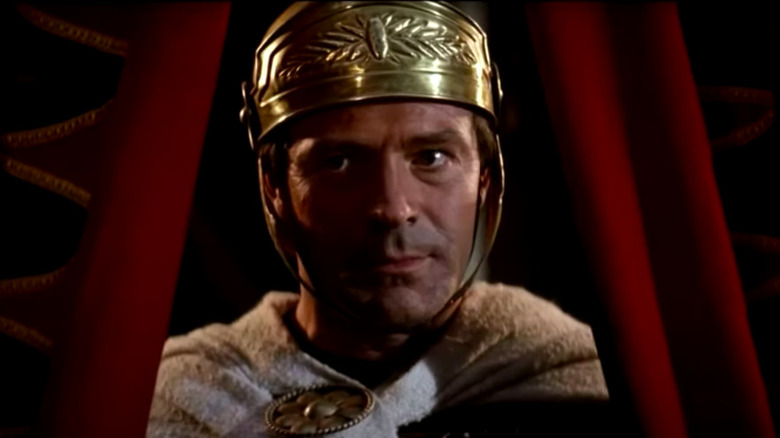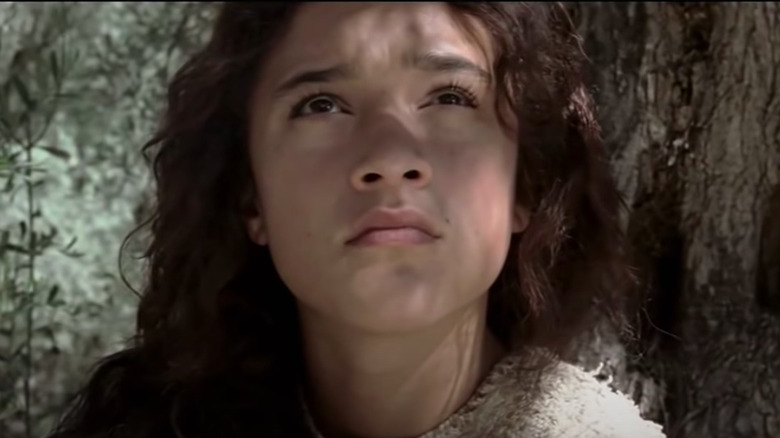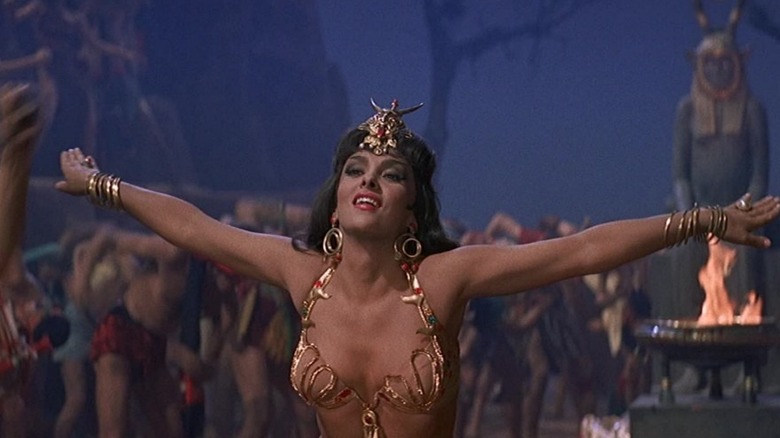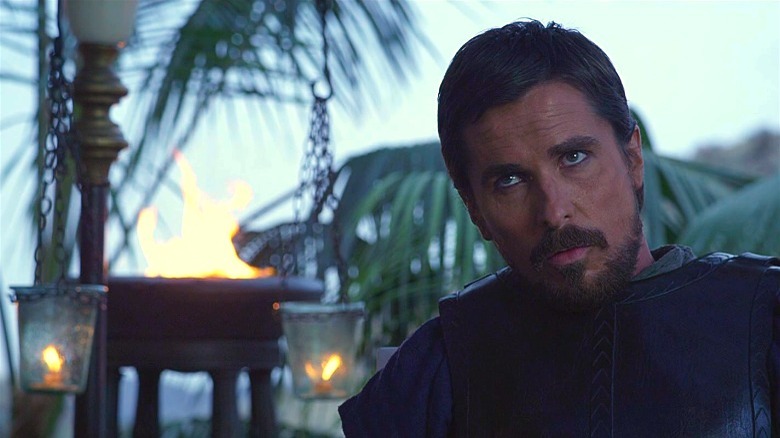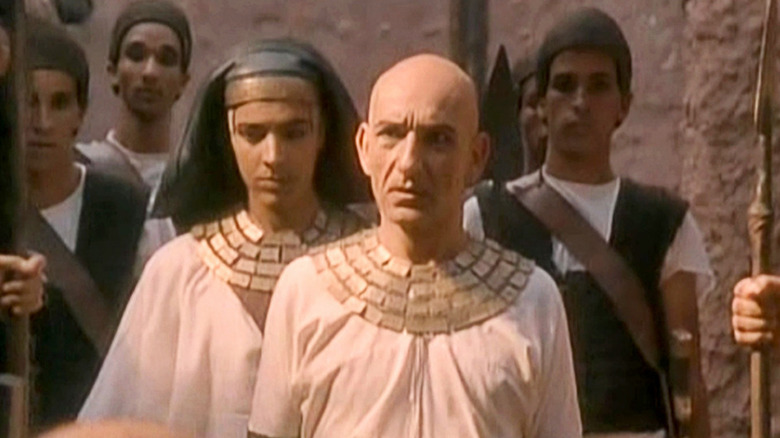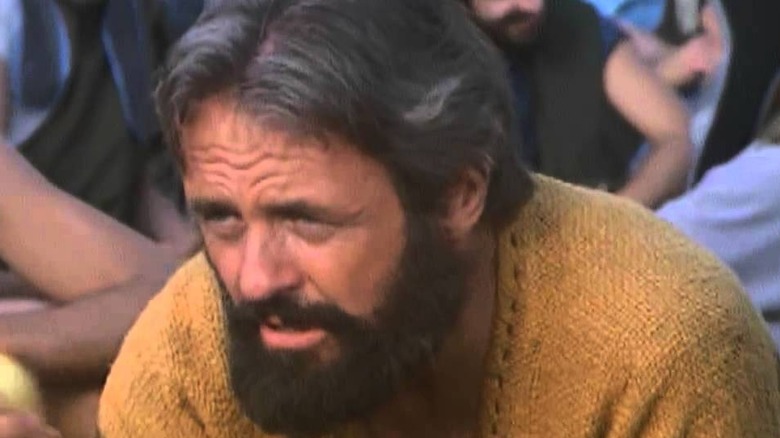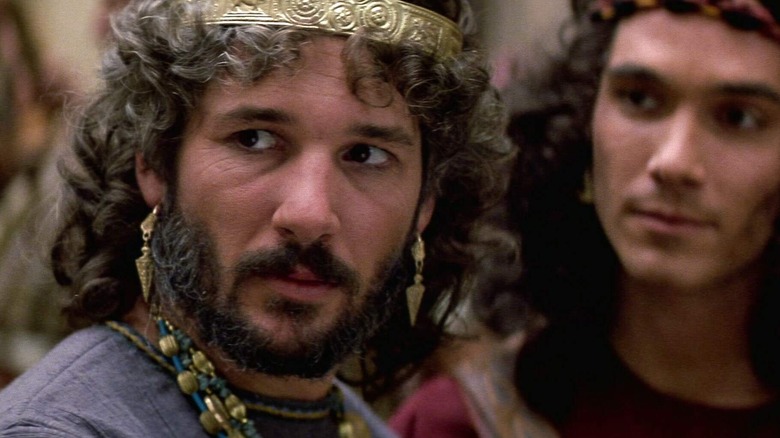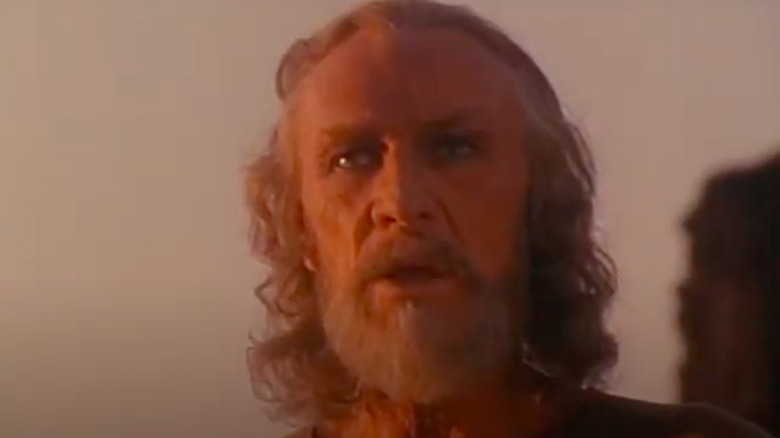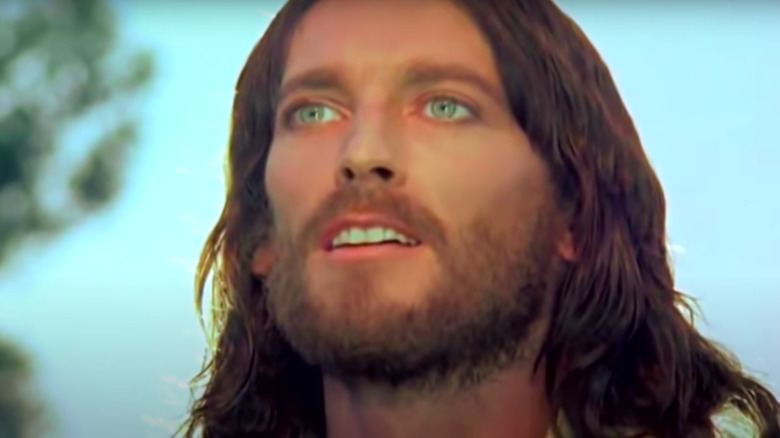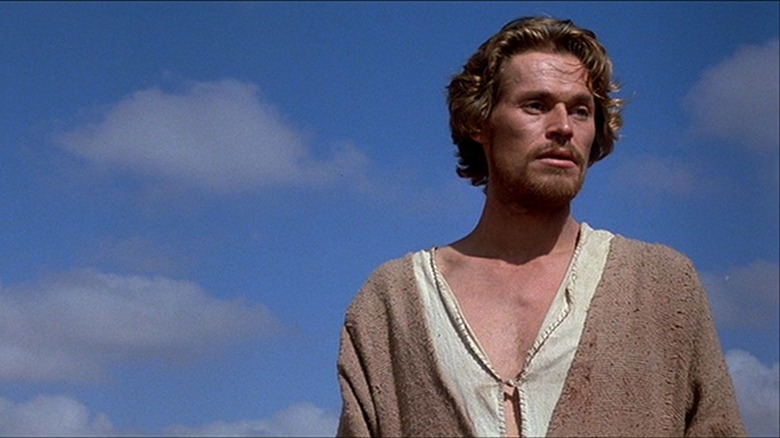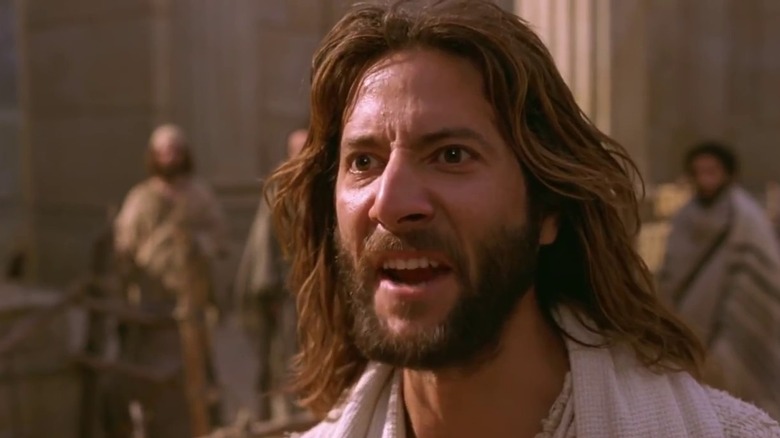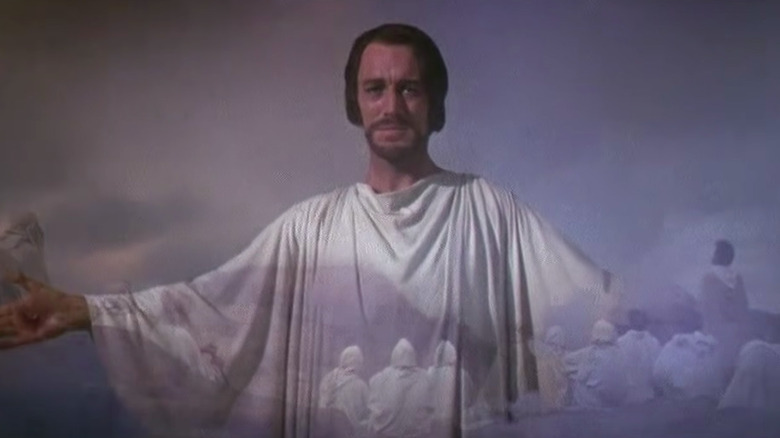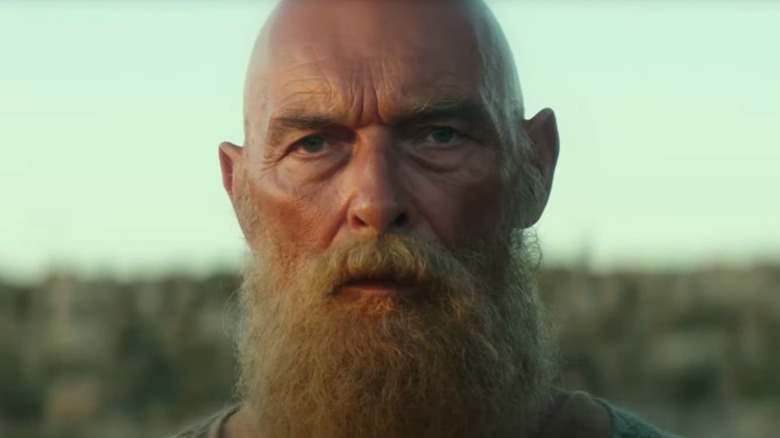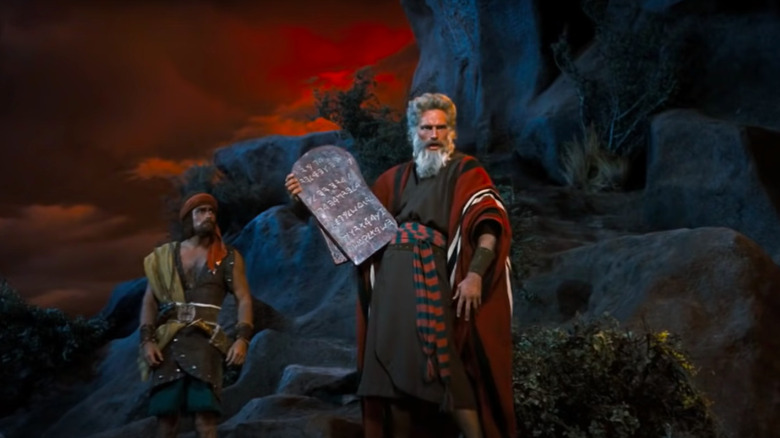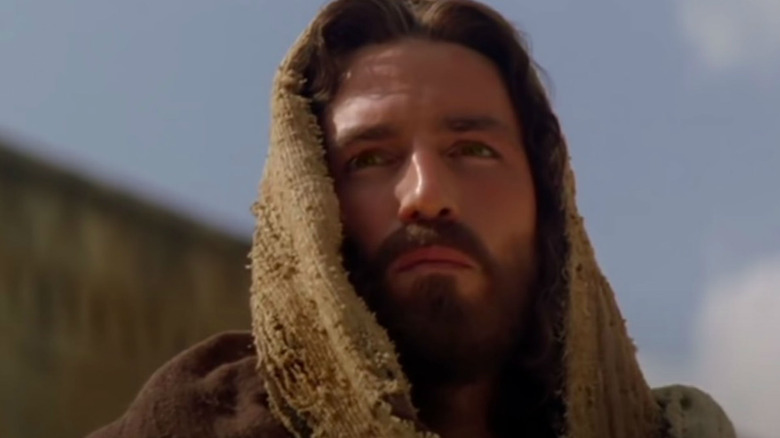25 Movies About The Bible You Should Add To Your Must-Watch List
Contrary to popular belief, the Bible isn't a book — it's a collection of books. How many? There are 24 books in the Hebrew Bible (the Old Testament in the Christian Bible), 66 books in the King James Bible, and 73 books in the Catholic Bible. So suffice it to say, there are a lot of opportunities for cinematic adaptations. However, while there are plenty of books in the Bible that haven't been adapted into film (we're still waiting for that Mel Gibson-directed Maccabees movie, buuuut we don't think that'll ever happen), there are many more that have — more than we could ever cover here.
So given it would take you less time to read the Bible than to watch every Bible-based movie, we're going to highlight the top 25 you need to see. Given the Bible has been around for a couple millennia, cinematic adaptations span the dawn of film. What makes our selections "must-watch?" We picked these movies based on the quality of their cinematic storytelling, the authenticity of their adaptations, their cultural footprint, and in some cases, all of the above.
We're not including "extra-Biblical" movies, basically sword-and-sandal epics that tie into the Bible, but aren't in the Bible (e.g. "Ben-Hur," "The Robe"); movies about saints or the clergy (e.g. "Father Stu", "Silence"); or general faith-based films ("Heaven Is For Real," "The Blind Side"). From massive cinematic epics, to intimate character dramas, here are 25 movies about the Bible you should add to your must-watch list!
The Bible: In The Beginning...
While "The Bible: In The Beginning..." isn't the first movie to be based on the Bible, or even the oldest movie on our list, it's a good place to start, given the Book of Genesis is literally the first book of the Bible. Released in 1966, "The Bible" spans Adam and Eve to Abraham, so it was quite an ambitious task. But what else would expect from bombastic producer Dino De Laurentiis and rapscallion actor-director John Huston ("The Maltese Falcon," "The Treasure of the Sierra Madre")? Huston not only directs the film — he plays Noah. Why he cast himself as the guy who has to work with animals we'll never know. Huston also cast himself as The Narrator and the voice of God, so obviously he had an ego.
"The Bible" features a stacked cast — including Richard Harris as Cain, George C. Scott as Abraham, and Ava Gardner as Sarah — and comes in just shy of three hours. Critical opinions on "The Bible" vary, with some calling it a "strictly formulaic Biblical work" (John A. Nesbit, "Old School Reviews"), while the late, great Pauline Kael ("The New Yorker") boasted that "Huston's triumph is that despite the insanity of the attempt and the grandiosity of the project, the technology doesn't dominate the material." So that alone makes it worth a viewing. "The Bible" is a solid Biblical epic, and while it probably wouldn't make our "top ten" list, it definitely earns its spot on this one.
Noah
While Biblical epics were Old Hollywood's bread and butter, Hollywood's relationship with Bible-based movies for the past 40 years has been, well, odd. Basically Hollywood will make, shall we say, "creative" adaptations of Biblical stories, attempt to attract a faith-based audience, and then wonder why that audience doesn't show up in droves. Enter "Noah," Darren Aronofsky's controversial 2014 adaptation of the Genesis story of Noah and the Ark.
"Noah" had an all-star cast, with Jennifer Connelly, Emma Watson, Ray Winston, Anthony Hopkins, and Russell Crowe as the titular Noah. You can see the controversy in the divide between critics and audiences' scores on Rotten Tomatoes. The film's controversy stems from director Aronofsky's avowed atheism, including bragging to The New Yorker that "Noah" was "the least Biblical Biblical film ever made." Yep, just what faith-based audiences want to hear.
However, despite Aronofsky's provocative claims to the contrary, "Noah" mostly hews to Biblical tradition, while its $359 million worldwide box office (the majority of which was earned largely overseas) makes it one of the most successful controversial movies of all time, Biblical or otherwise.
Jesus Christ Superstar
Let's get this out of the way first — there's no Biblical evidence that Jesus Christ was a high tenor who sang throughout his earthly ministry. That said, "Jesus Christ Superstar" is loosely based on the four Gospels, though it owes more to composer Andrew Lloyd Webber and lyricist Tim Rice than it does Matthew, Mark, Luke or John. Directed by musical veteran Norman Jewison ("Fiddler On The Roof"), "Jesus Christ Superstar" is the 1973 adaptation of the 1970 rock opera/concept album of the same name. Based on its Rotten Tomatoes score, critics didn't much care for "Jesus Christ Superstar," while moviegoers were mostly into it (a running theme on this list).
It belongs on our must-watch list largely because of the late, great Carl Anderson's performance as Judas Iscariot and Ted Neeley's role as Jesus Christ (which he is still performing to this day — seriously, it's wild). Try not to sit in absolute awe when Anderson belts out "Heaven On Their Minds" or get a lump in your throat when Neeley sings "Gethsemane." Alongside The Who's "Tommy," "Jesus Christ Superstar" inaugurated the rock opera, and launched Webber ("Cats," "The Phantom of the Opera") and Rice's ("Aladdin," "The Lion King") respective careers. Sure, "Jesus Christ Superstar" may not quite pass muster at Sunday school, but it's definitely a must-watch Biblical movie.
The Miracle Maker
A movie about the life of Jesus Christ, but told in stop-motion, claymation style, à la Rankin/Bass, sounds like a "SNL" skit in really poor taste. However, it is the basis of one of the most under-seen, but definitely one of the best, cinematic interpretations of Christ's life — "The Miracle Maker." The 1999 family film was British-American-Russian co-production between Mel Gibson's Icon Productions and BBC Films (among others), and features a who's who of esteemed thespians lending their voices, including William Hurt as Jairus, Alfred Molina as Simon, Emily Mortimer as Mary, and Ralph Fiennes as Jesus (in the English version; Ioan Gruffudd voiced Jesus in the Welsh version).
If the idea of Amon Göth and Voldermort voicing Jesus seems off, just remember that Fiennes is a brilliant actor and nails the voice performance. While Fiennes is fantastic, make no mistake, it's not just his performance that makes "The Miracle Maker" a must-watch. As Stephen D. Greydanus of Decent Films puts it, "The Miracle Maker" is: "Quite simply one of the most genuinely profound and noteworthy depictions of the gospel story of all time, in any medium." High praise, indeed. While "The Miracle Maker" is definitely meant for young fans, it's a must-watch for any viewer.
Samson and Delilah
While Biblical cinematic adaptations have been around since before the dawn of sound, they were never more prolific than the 1950s. American cinema in the 1950s was full of massive, colorful, big-budget Biblical epics, either based on stories from scripture ("The Ten Commandments") or on extra-Biblical stories loosely tied into scripture ("Ben-Hur"). However, the era of the Biblical epic arguably kicked off in 1949 with Cecil B. DeMille's "Samson and Delilah."
Yes, that Cecil B. DeMille, the director who achieved the high watermark of the Biblical epic with the story of Moses from the Book of Exodus in 1956's "The Ten Commandments," but who launched the genre with the most famous tale from the Book of Judges. Hedy Lamarr plays Delilah, the Philistine woman who seduces the hero of the Israelites, Samson (played by Victor Mature), into surrendering the secrets of his strength, resulting in the world's most famous haircut. While the Rotten Tomato scores reveal that neither critics nor fans were very impressed with "Samson and Delilah," it's still a must-watch thanks largely to Lamarr's performance and DeMille's lavish direction, inaugurating the genre he would define and dominate.
David and Bathsheba
Following the rapid spread of the small screen to America's living rooms, Hollywood had to remind former moviegoers why the big screen was better. Thus, the switch to the wide-screen format under names like "Cinerama," glorious Technicolor so vivid it was like looking at a Renaissance painting, and 3D filmmaking (part one). But people go to movies for stories, so when Hollywood needed epic stories large enough for the big screen, they went to the Bible. One of the first of these 1950s Biblical epics was 1951's "David and Bathsheba," which makes sense, as it features one of the Bible's most famous figures, King David.
Predating the gold standard of the Biblical epic, Cecil B. DeMille's 1956 "The Ten Commandments," "David and Bathsheba" stars Gregory Peck as David and Susan Hayward as Bathsheba, focusing on how David's adulterous affair with the bathing beauty risks the wrath of God (more famous stories, such as David killing Goliath with a slingshot, are told in flashback). Decades later, critics are still mostly pleased with director Henry King's adaptation of the Book of Kings, though moviegoers are less impressed. While "David and Bathsheba" is more enjoyable as a 1950s cultural touchstone than a Biblical adaptation, it's still a must-watch, ideally at a drive-in movie theater in the front seat of a 1951 Chevrolet Styleline Deluxe convertible.
Esther and the King
Hollywood fell in love with the Holy Book in the 1950s, largely thanks to its ability to lure moviegoers away from their TV sets and back into movie theaters. By the end of the 1950s, Hollywood film producers were reaching the bottom of the barrel on the Bible, having told the stories of most of the most famous patriarchs, such as David, Samson, and Moses. So in 1960, 20th Century Fox and director Raoul Walsh told the story of one of the Bible's most famous matriarchs, Esther, in "Esther and the King."
Based on the Book of Esther (one of only two Biblical books, alongside the Song of Songs, to not mention God) "Esther and the King" is about a Jewish woman selected to marry the Persian King Ahasuerus, who selflessly uses her royal status to thwart a genocide of her people. Starring Joan Collins as Esther, "Esther and the King" is not the best Biblical adaptation, let alone one of the best adaptations of the story of Esther. However, thanks to its massive scope and visuals, it's a must-watch for fans of the Biblical genre, especially the Biblical epics of the era.
King of Kings
While Jesus Christ is the most famous figure from the Bible, or y'know, from western culture, period, he wasn't prominently featured in the Biblical epics of the 1950s, save a cameo in 1959's "Ben-Hur." The reason is the story of an itinerant preacher who ministers about peace and love didn't exactly lend itself to the epic scope of the medium in the 1950s (which helps explain why Jesus movies have been more prominent since the 1960s). However, that all changed with 1961's "King of Kings."
Directed by Nicholas Ray, and starring Jeffrey Hunter as Jesus (who famously played Captain Pike in the rejected pilot of "Star Trek") and Rip Torn as Judas, "King of Kings" performs a delicate balancing act — telling the intimate, character-driven story of a peaceful preacher and his followers, but set against the backdrop of a massive, sword-and-sandals-style Biblical epic. It was harder than it looks, which is probably why Ray (the director of 1955's James Dean classic "Rebel Without A Cause") was selected. "King of Kings" largely succeeds, earning strong Rotten Tomatometer scores from both critics and moviegoers. While it may rely a little too heavily on spectacle, "King of Kings" is a more thoughtful and poignant Biblical epic than most.
The Nativity Story
Mary was called the "World's Most Powerful Woman" by National Geographic. However, like the proud mom who prefers to showcase her child's accomplishments ahead of her own, when it comes to the big screen Mary has largely been a supporting character in films about her son, not the star of her own. However, 2006's "The Nativity Story" changes all that with a cinematic adaptation of one of the most famous stories ever, the journey of Mary and Joseph detailed in the Gospels of Matthew and Luke, leading to the birth of Jesus Christ. You might have heard of this story by its more popular name — Christmas.
Starring Academy Award nominee Keisha-Castle Hughes as Mary and Oscar Isaac in one of his first roles as Joseph, "The Nativity Story" tells a story we've seen many times before (especially if your kid played Sheep #2 in the annual Christmas pageant), but is one of the few films, perhaps the only film, to focus exclusively on it. That alone makes it a worthy inclusion on our must-watch list, even if there is a big gap between critics and moviegoers' opinions based on its Rotten Tomatoes score. While not the best Biblical adaptation or Christmas movie, "The Nativity Story" is a must-watch because it's one of the few movies about the world's most powerful woman.
The Gospel According to Saint Matthew
While there have been plenty of controversial Biblical films, Pier Paolo Pasolini may be the most controversial Biblical filmmaker (yes, even more than Martin Scorsese or Mel Gibson). An avowed atheist Marxist who was mysteriously murdered, Pasolini was also a maestro of Italian cinema, whose contributions to European Neo-Realism put him in the same conversation as his fellow Italian Vittorio De Sica, and French filmmakers Jean-Luc Godard and François Truffaut.
Rather than reverence, it is Pasolini's "on-the-ground," "man-on-the-street," sense of realism that makes his most famous film, 1964's "The Gospel According to Saint Matthew," one of the best cinematic adaptations of Jesus' life. Despite highlighting Pasolin's interpretation of the political nature of Christ's message, the film isn't preachy in the political sense, and closely follows the Biblical text, albeit filmed in a fresh, almost documentary style moviegoers hadn't seen before. Perhaps the only Biblical movie you'll ever see taught in film schools, "The Gospel According to Saint Matthew" is a big hit with critics and fans, and a more-than-worthy inclusion on our must-watch list.
Solomon and Sheba
Three years after Yul Brynner became famous playing a king courting a foreign-born woman in "The King and I" and a king in the quintessential Biblical epic in "The Ten Commandments," he decided to do both in 1959's "Solomon and Sheba." Brynner plays the titular King Solomon, the wise poet-turned-king whose father King David rules he should succeed him instead of his older brother, leading to squabbles amongst the family and surrounding tyrannical nations, who don't go in for Solomon's monotheistic worship. Gina Lollobrigida plays the Queen of Sheba, who is recruited by the Egyptian pharaoh to corrupt wise King Solomon.
Admittedly, "Solomon and Sheba" is one of the most uninspired entries on our list, and features some of the worst Tomatometer reviews, with the normally great King Vidor's direction feeling more like fulfilling a studio mandate than creating something meaningful. So why does it make our list? One, because pretty much every Yul Brynner movie is worth at least one viewing; and two, because it represents a time in American cinema when Biblical epics were the superhero stories of their day: Massive mainstream movies that didn't have to be great, or even good, to earn gazillions.
Exodus: Gods and Kings
Hollywood lured moviegoers back into the multiplex in the 1950s to great success with religious-themed epics like "The Ten Commandments" and "Ben-Hur." Hollywood tried again in the 2010s, with literally the exact same stories, only this time with much different results. We won't get into "Ben-Hur" (either the 1959 blockbuster or 2016 flop), as it's an extra-Biblical movie not based on Scripture. The same can not be said for "Exodus: Gods and Kings," Ridley Scott's epic retelling of the story of Moses from the Book of Genesis, starring Christian Bale as Moses and Joel Edgerton as Ramses.
"Exodus" didn't connect with critics or fans based on its Tomatometer score, while its $268 million worldwide gross on a $140 million budget makes it a bomb on a Biblical scale. Despite not being particularly good artistically or successful financially, "Exodus: Gods and Kings" makes our list simply because it was such a breath of fresh air in our modern cinematic landscape obsessed with sequels, superheroes, and superhero sequels. Besides Bale and Edgerton as the leads, "Exodus: Gods and Kings" features Ben Kingsley, John Turturro, Aaron Paul, and Sigourney Weaver in supporting parts.
For fans of the Biblical epic, an all-star cast, and an A-list director filming a big-budget retelling of a story from Scripture just doesn't happen anymore. Sadly, based on this film's failure, it's doubtful it will happen again anytime soon.
Joseph
If you think your family is dysfunctional, consider the story of Joseph from the Book of Genesis. The most beloved twelfth son of Jacob (later named Israel), Joseph is sold into slavery in Egypt by his brothers because their father gifted him a swanky new coat. There's "not inviting you to the family reunion" petty and then there's "selling you into slavery because your dad gave you a nice jacket" petty.
Released as a TV mini-series on TNT, "Joseph" tells this famous story with Paul Mercurio as the titular Joseph, Martin Landau as his father Jacob and Ben Kingsley as Potiphar, the Egyptian captain of the Pharaoh's guard who eventually makes Joseph the master of his household, only to imprison after his wife tries to seduce him.
Hey, nobody said the Bible was G-rated. Just over three hours long, "Joseph" does justice to the story, and earned much-deserved Emmy nominations for Supporting Actor for Ben Kingsley and Outstanding Miniseries, among others.
Peter and Paul
Next to Jesus Christ himself, few Biblical figures were more consequential to the spread of Christianity than St. Peter and St. Paul. However, you wouldn't know that based on their respective filmographies. The 1981 TV mini-series "Peter and Paul" attempted to rectify that. Originally released on CBS, "Peter and Paul" retells the Book of Acts of the Apostles, chapters 8 through 28, with a particular emphasis on its two principal figures.
"Peter and Paul" stars Anthony Hopkins as Paul of Tarsus in a scene-stealing performance alongside Robert Foxworth as the apostle Peter. Despite the outstanding lead performances, "Peter and Paul" was only nominated for two Emmys, both in technical categories, though it won for Outstanding Makeup. However, it's not just the makeup that's outstanding about this movie. At over three hours, "Peter and Paul" is likely to take you more than one sitting to finish, but it is definitely worth it, especially for those who only think of Peter and Paul as the folk singers who wrote "Puff the Magic Dragon."
King David
We said this was a list of the "must-watch" Biblical movies; that doesn't mean every single one of them is actually good. Take "King David," for instance. In 1985, Hollywood attempted to bring back the big-budget Biblical epic, mixing the scope of the grand 1950s sword-and-sandal pictures, with the introspection of the 1970s New Hollywood character studies. It sounds like an admirable idea, until you realize it's hard to find any actor, no matter how talented, who can successfully pull off both.
Compare Russell Crowe in "Gladiator" to Colin Farrell in "Alexander" to see what we mean. Richard Gere falls into the latter category, as even at the peak of his 1980s star power still seems too small for the role of the Biblical king. Not that the movie he was in did him any favors. Despite clocking in at one hour and fifty-four (what kind of Biblical epic is less than two hours?!), "King David" is nevertheless overstuffed, trying to squeeze in a mini-series' worth of story into a multiplex-friendly runtime.
With $4 million at the box office ($12 million in today's dollars) "King David" crashed and burned, while also earning the worst Tomatometer scores on our list. And yet we still think you should watch it, if only to realize just how hard making a satisfying Biblical adaptation truly is.
Abraham
The late great Richard Harris will be remembered by one generation as King Arthur in "Camelot" and another as Dumbledore in the first two "Harry Potter" films. However, true cineastes will remember him for his greatest performance, as Captain Nolan in the 1977's "Jaws" ripoff "Orca: The Killer Whale." We kid, we kid (kinda). But one film that definitely belongs on Harris' "best-ever" list is his role as Abraham in the TV miniseries of the same name, released on TNT in 1993.
Despite being the patriarch of three great world religions (Christianity, Islam and Judaism), and thus the spiritual forefather of literally the majority of the world's population, Abraham's cinematic output has been relatively sparse. Maybe because, when compared to Moses or David, the story of Abraham is less cinematic. What "Abraham" lacks in scale or scope, it makes up for in quality, driven by Harris' lead performance, for which he was criminally only nominated for one award, the CableACE award. Whatever. "Abraham" is a must-watch, not only as one of the best Biblical movies, but as one of the finest performances from one of our greatest actors.
One Night with the King
"One Night With The King" sounds like the kind of movie that doesn't belong on a list of Bible films, if you catch our drift. But remember, if the Bible were a movie, it'd definitely be rated-R for violence and sexual content. And besides, "One Night With The King" is a purposefully more provocative title than "Esther." Esther has probably been given the cinematic treatment more than any other Biblical matriarch, and more than many other patriarchs as well. The reason is, her story of rescuing her people continues to resonate millennia after millennia.
While the critics didn't like it, giving it one of the worst scores on our list, audiences disagreed and gave "One Night With the King" a strong score. Released in 2006, "One Night With The King" was one of Hollywood's first attempts to recreate the record-setting performance of "The Passion of the Christ" in 2004 with faith-based audiences. However, lacking that films', well, passion (or its controversy), "One Night With The King" earned only $13 million at the worldwide box office, not bad for a faith-based film, but a loss thanks to its $20 million budget. Thankfully, that budget went to great production value and a stellar cast, including Peter O'Toole, Omar Sharif, Jonathan Rhys-Davies, and standout newcomer Tiffany Dupont as Esther. Esther's story has been told cinematically many times before; "One Night With the King" is one of the best.
The Prince of Egypt
Dreamworks Animation would one day rival Disney for its animation output, with blockbuster brands like "Shrek" and "Kung Fu Panda." The animation powerhouse kicked things off with the "Woody Allen plays an ant," CG-animated "Antz," followed by one of our must-watch Biblical movies — "The Prince of Egypt." Foregoing the CG-animation techniques inaugurated by "Toy Story" in 1995 that have been in vogue ever since, "The Prince of Egypt" is a classic, Disney-esque musical that uses traditional, hand-drawn animation (with some CG backgrounds here and there), which seems appropriate for its tale of Moses and the Exodus out of Egypt.
Dreamworks had big hopes, for "The Prince of Egypt," as this is no straight-to-video (and straight to Sunday school) animation job, but a major theatrical release. Besides the stunning animation, "The Prince of Egypt" features a stacked voice cast, including Val Kilmer as Moses and the voice of God, Ralph Fiennes as his brother Rameses, Michelle Pfeiffer, Sandra Bullock, Danny Glover... yeah, it's a lot.
Buoyed by its strong reviews from critics and moviegoers, "The Prince of Egypt" was a big hit at the box office too, earning $218 million on a $60 million budget. Sadly, Dreamworks only released one more Bible-based movie, the direct-to-video, "Joseph: King of Dreams," ditching the good book for storybooks, with multiple Shrek sequels.
Jesus of Nazareth
Clocking in at roughly six hours and 22 minutes (depending on which version you watch), "Jesus of Nazareth" is the longest movie on our list, which includes plenty of long movies. It's not a quick watch that you can finish in one afternoon — but it is totally worth it for those willing to tackle its massive running time. True to its name, Franco Zeffirelli's lengthy retelling chronicles Jesus' life, from the marriage of Mary and Joseph, to the Nativity, through his ministry, and concluding with the Crucifixion and Resurrection. Basically a blend of all four Gospels, but in TV mini-series form.
"Jesus of Nazareth" was released in four episodes on NBC in 1977 during the height of the TV mini-series boom, and earned a massive rating of 30.8, making it the ninth most successful mini-series of all time. "Jesus of Nazareth" also boasted a star-filled cast, including Laurence Olivier as Nicodemus, James Mason as Joseph of Arimathea, Anne Bancroft as Mary Magdalene, James Earl Jones as Balthazar, Anthony Quinn as Caiphas, and Christopher Plummer as Herod.
Yet despite all that star power, the series' standout was Robert Powell as Jesus, who gives a stirring performance that remains, decades later, the quintessential cinematic Christ for millions of viewers.
The Last Temptation of Christ
Martin Scorsese's "The Last Temptation of Christ" may be a controversial inclusion on our list (and not just because of all of the other reasons it's so controversial). While it is, of course, based on the Bible, it is technically an adaptation of Nikos Kazantzakis' 1952 novel of the same name. However, most of the movie and books' content still comes from the Gospels, albeit filtered through Kazantzakis, Scorsese and screenwriter Paul Schrader's imaginations. We included it, because, let's be honest, every movie on this list takes creative liberties. Besides, you can't have a list of "must-watch" Biblical movies and not include "The Last Temptation of Christ."
Despite its Biblical basis, this isn't the Jesus you see in other movies, or the Gospels for that matter. As played by Willem Dafoe, this Jesus is self-doubting, uncertain, and oftentimes confused as to God's will. In other words, this Jesus is a lot like most viewers. Thus, "The Last Temptation of Christ" is less a celebration of faith than a rumination on it, using Christ as a metaphor for the spiritual experience, not the source of it.
Naturally this doesn't sit well with many faithful viewers, though it does make for a compelling cinematic experience, one largely praised by critics and moviegoers alike. There's nothing to say about "The Last Temptation of Christ" that hasn't already been said, so we'll say see it and decide for yourself, and leave it at that.
The Gospel of John
Most Jesus movies pick and choose parts of the four Gospels to tell their story. "The Gospel of John" is different. As that name states, this movie is an adaptation of just John's Gospel, thus there's no infancy narratives or Nativity scenes, which are recorded only in the Gospels of Matthew and Luke. And when we say it's an adaptation of the Gospel of John, we do mean the entire Gospel, with no omissions or additions. Thus, "The Gospel of John" oftentimes operates at a leisurely pace over the course of its three-hour running time.
This storytelling style wasn't a big hit with critics, who gave it a "Rotten" review on Rotten Tomatoes, with a consensus review saying that it "takes a reverent approach to its story without ever bringing it to life." However, audiences completely disagreed, giving it a strong "Fresh" rating, resulting in one of the biggest divides between critics and audiences on our list. We're siding with the audience on this, with the caveat that if you're looking for a rousing, big-budget, Biblical epic, look elsewhere; this is a methodically paced mediation on spirituality, anchored by Henry Ian Cusick's moving portrayal of Jesus.
The Greatest Story Ever Told
With a title like "The Greatest Story Ever Told," a film better deliver. In fairness, the movie says it's the greatest story ever told, not the greatest movie ever made, so there's that. Following in the footsteps of 1961's "King of Kings," 1965 "Greatest Story" is once again an epic, big-budget, lengthy retelling of Christ's life by way of Hollywood, California.
Movies about Jesus' life don't come any bigger. "The Greatest Story" was directed by Hollywood heavyweight and multi-time Academy Award-winner George Stevens ("Giant," "A Place In The Sun"), shot in the Ultra Panavision process (the IMAX of its day), and with supporting roles by multiple stars, including Charlton Heston (the star of "The Ten Commandments" and "Ben-Hur") as John the Baptist. Yet at its center is a grounded, touching performance by Swedish actor and Ingmar Bergman-favorite Max Von Sydow ("Wild Strawberries," "The Seventh Seal") in his first American film.
Your appetite for "Greatest Story" may vary, as you feel every second of the film's three hour and fifteen minute runtime. However, when it comes to epic Biblical productions, "The Greatest Story Ever Told" is undoubtedly one of the, well, greatest.
Paul: Apostle of Christ
St. Paul's life and work are chronicled almost as much in the New Testament as Jesus himself. The end of his life is detailed masterfully in "Paul: Apostle of Christ." While we are excluding movies based on saints, we're including "Paul," as much of his story is told in the Book of Acts of the Apostles and throughout his letters to the various early Christian churches. You might think this wouldn't make for a very rousing movie; you'd be mistaken. "Paul" is not only a moving portrait of a brave man standing up for what he believes in, but a stirring account of courageous people withstanding unimaginable religious tyranny and persecution.
Despite the title however, the central character in "Paul" is actually St. Luke, the Gospel author and writer of Acts, played by James Caviezal, who famously played Jesus in "The Passion of The Christ." Meanwhile, Paul is more of a supporting character, though thanks to James Faulkner's dominating performance, Paul's presence is always felt.
The film follows three interconnected stories; Paul in prison awaiting his execution at the hand of Roman authorities, early Christians in hiding, and Luke as a physician tending to a Roman prefect's dying child. While movie critics weren't impressed, moviegoers were. We side with the moviegoers, and consider this a must-watch for its under-seen portrait of the early church.
The Ten Commandments
When you think of "Biblical epic," one movie springs to mind — Cecil B. DeMille's "The Ten Commandments." Heck, when you think of the word "epic," period, this movie belongs in the conversation. Movies do not come any bigger than "The Ten Commandments," Biblical or otherwise. In an era when Hollywood was luring moviegoers back into theaters by way of massive stories based on the Bible, and moviegoers were showing up in droves, none stood taller than "The Ten Commandments." Make no mistake, "The Ten Commandments," isn't just a totem to a bygone era in Hollywood or American pop culture history. It is a uniquely cinematic experience and artistic achievement that stands the test of time.
Charlton Heston stars as Moses in a literal cast of thousands (no CG armies here, those are all real-life extras), alongside Yul Brynner as Ramses. While Heston and Brynner deserve credit for keeping this movie grounded, the true star is the director, Cecil B. DeMille. Today, filmmakers shoot movies in studios decked out in green screens that VFX artists later turn into spectacle. Not here. DeMille made one of the biggest movies of all time, and made it look easy too. Even so, "The Ten Commandments" was also an innovator in optical effects, with Moses parting the Red Sea one of the most memorable VFX shots in history. Still boasting across-the-board "Fresh" scores on Rotten Tomatoes, "The Ten Commandments" is not only a must-watch, but the best Biblical epic of all time.
The Passion of the Christ
Lots of movies make money. Plenty win awards. But very few films dominate the cultural conversation and change the culture around them like "The Passion of The Christ." To say "The Passion of the Christ" was controversial doesn't do it justice; it was all people talked about for months in 2004, and remains one of the defining cinematic achievements of the early 2000s. Even today, its millions of supporters continue to routinely revisit it with the consistency of a religious ritual. Despite earning $622 million worldwide, making it one of the top ten highest-grossing, R-rated films ever (unadjusted for inflation), "The Passion" is not an easy watch, as it earns its R rating.
As Roger Ebert put it in his four-star review, "this is the most violent film I have ever seen." Not sure we agree there, but his point stands. "The Passion" is a visceral, violent movie that repels some audiences, and deeply moves others. You can see this divide in the critics and audience scores on Rotten Tomatoes. Basically you either really love it or really hate it; you won't find many people saying "The Passion" is "Meh, okay." Nearly two decades since Mel Gibson's passion project was released, "The Passion of The Christ" remains the most successful controversial movie ever made — and a must-watch movie about the Bible.
